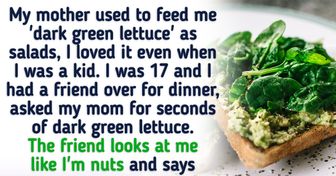When My Husband’s Cruelty Peaked, Help Arrived Unexpectedly

Having great skin isn’t just about good genetics — it’s also about having a great skincare routine and even better product choices. And the cost doesn’t have to be high since things you have in your pantry, such as carrots, honey, and cinnamon, can do wonders. You just need to find the best recipes and give them a chance to prove how they can benefit your skin.
Bright Side did some research about 7 highly beneficial natural ingredients that you can mix in your daily skin care routine, plus a bonus tip about the ones you should avoid.
Raw honey is known for its antibacterial properties on the human skin, especially for those struggling with acne or psoriasis. Manuka honey is thought to be so good that even doctors are using it in clinical settings. It’s important that the honey you use on your face is unpasteurized and as pure as possible in order for all the natural bacteria to be able to do their job. Before using the honey, you need to take an allergy test to make sure you’re not allergic to pollen.
Licorice root extract is used to treat eczema and acne, and that’s due to its antimicrobial properties. It can help reduce hyperpigmentation and slow down the aging process since they offer protection against harmful UV rays. It’s ideal for those suffering from itchy and irritated skin and can be combined with vitamin C before applying your regular sunscreen. You can create your own formula by mixing some extract with aloe vera gel, and you won’t have to worry about developing allergies since it’s rare.
Cinnamon does a great job at protecting your skin cells due to its antioxidant properties. There have been quite a few studies that suggest cinnamon extract has very beneficial collagen-promoting effects. If you want to use it in a mask, you can combine 3 parts of raw honey and 1 part of ground cinnamon and apply it to your face.
However, you should be cautious in case you have an allergy to cinnamon. Let it be noted that it will probably be more beneficial to your skin if you use cinnamon extract rather than ground cinnamon.
Carrots are rich in potassium and therefore can offer moisture to your dry skin. The vitamin A found in them can get rid of the excess oil gathered on your face while also removing all the toxins. Additionally, the beta-carotene in them protects the skin from UV rays and helps you fight the early stages of aging. You can either mix it with some aloe vera gel or create a mask by adding a teaspoon of honey and a teaspoon of milk.
Due to its high content in yeast and bacteria, Kefir can soothe your dry skin, help with redness, and energize your tired skin. It also promotes the production of collagen and hyaluronic acid, therefore getting rid of signs of aging and stress marks. It’s also ideal for exfoliation and can balance skin pH, which is crucial if you suffer from irritation and redness. For a face mask, you can take the juice of 1 cucumber and mix it with 2 tablespoons of Kefir and apply it to your face for 20 minutes.
Being rich in vitamins C and K, blueberries are great in helping wounds and cuts heal faster. However, this doesn’t mean that you should apply the raw fruits directly to your skin, but instead, eat a nice bowl of them. If you want to mix them in a mask, you can add some unflavored yogurt and apply. This will rejuvenate your skin, boost your collagen production, and fight premature aging.
Also, eating a lot of blueberries will improve your blood circulation and, therefore, your skin condition. Whether you eat them or put them on your face, blueberries can do wonders for your skin.
Apart from being a lovely aroma included in many fragrances, sandalwood is also great for your skin. It helps with scarring, inflammation, wrinkles, and even psoriasis. There have even been some studies showing how it can treat acne when used in home remedies by Indian grandmothers. There are 6 different types of sandalwood and you can use it in its powder, oil, soap, or floral water forms.
One great recipe you can follow is mixing 2 tablespoons of sandalwood powder with 1 tablespoon of rose water. Then apply it to your clean and dry face for 10-15 minutes.

What natural ingredient do you swear by in your daily skin care routine? And have you seen a big difference in your skin since you started using it?











